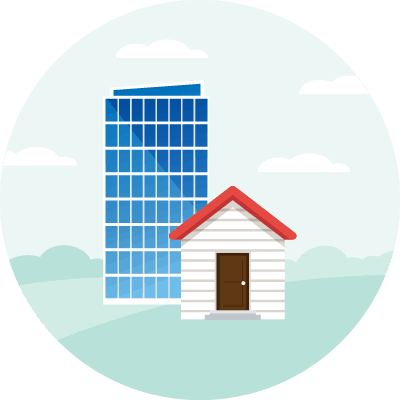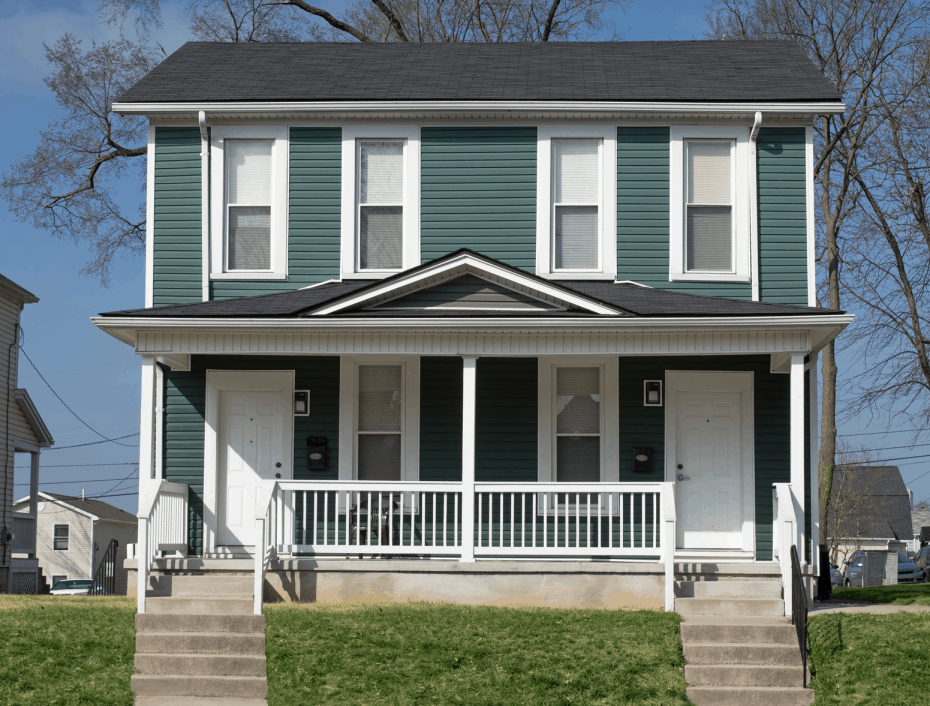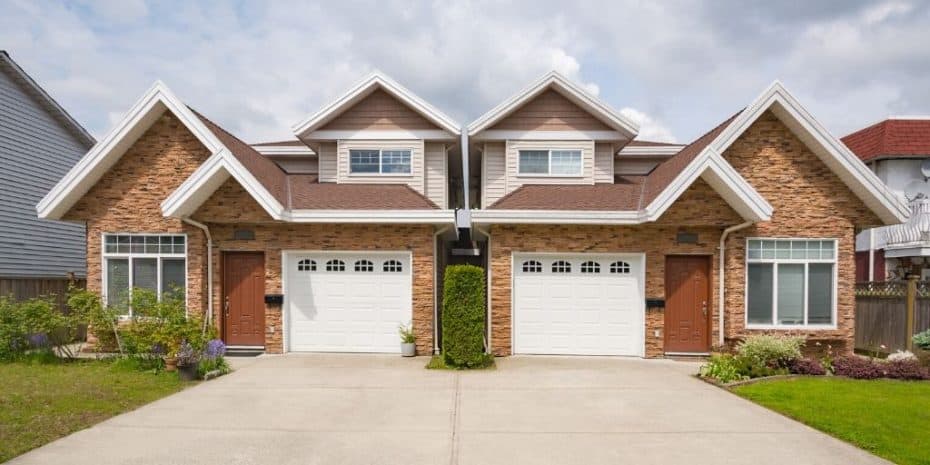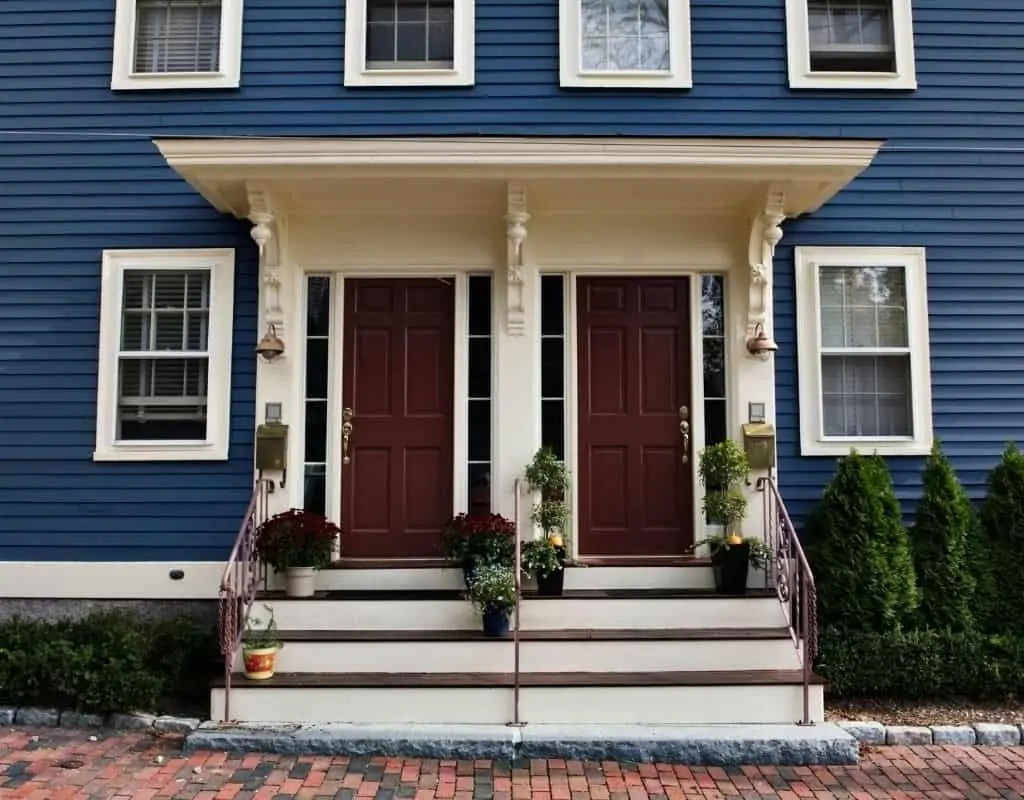What Is a Duplex?
Duplex vs. Duet Home, Twin Home, or Townhome
From appearances, most duplexes look very similar to a duet home, twin home, or townhome. The difference is in the ownership structure.
A duplex is sold as a single real estate transaction giving the buyer ownership to both units of the duplex. Owners of duplexes commonly do one of the following[1]:
- Rent both units, collecting monthly rental payments from two different tenants.
- Live in one unit and rent the other.
- Live in one unit and allow a friend or family member to reside in the other unit in a non-rental arrangement.
- Live in one unit and use the other as a guest house when family and friends come to visit.
- Utilize one or both units as a vacation rental.
Similar to a duplex, a duet home, twin home, or townhome will share a common wall (or ceiling in the case of a top-to-bottom arrangement), however, these are single-family attached homes that are sold separately.
Duplex vs. Apartment
A duplex and an apartment may seem similar, but there are differences between them. A duplex is a residential property that comprises two separate units found within the same building, usually located in the outskirts of town or in the suburbs of a big city. On the other hand, an apartment is a residential unit that is located within a complex of other residential units. In other words, if you live in a duplex, you only need to share a wall with one other unit, while in an apartment, you will likely have neighbors on both sides of your unit.
Duplexes are also bigger than apartments; in general, each unit has a square footage of over 1,000, while each unit in an apartment has slightly less than that (about 940)[2]. This makes them more expensive than an apartment.
Advantages of Owning a Duplex
Some people buy duplexes with the intent of living in one unit and renting out the other (a common house hacking strategy)[3].
Other real estate investors buy duplexes purely as a non-owner-occupied investment property, with the intent of renting out both units and maximizing their cash flow.
Regardless of the property owner’s intent, there are several advantages to owning a duplex that a single-family home cannot offer.
Financing Options: Conventional lenders will generally classify properties into owner-occupied or non-owner-occupied. Owner-occupied duplexes typically get lower interest rates than those that are non-owner-occupied, because the borrower resides in the property and generally has a greater vested interest in keeping the property maintained and in good working order.
Mortgage lenders often view duplexes as a single property and will finance this type of multifamily building with a residential loan. Because of these residential financing options, duplexes may qualify for lower down payment financing options, like an FHA loan, which only requires 3.5% down if the owner intends to live in one of the units[4].
Income Generation: Depending on the market and the subject property, a cash-flowing duplex can often generate more income than a single-family property of a similar size.
Lower Expenses: The ongoing monthly expenses for a duplex will often be lower because of the greater efficiencies that apply with two side-by-side units that share the same roof, the same driveway, the same yard, and other common areas. Other annual expenses like property insurance, maintenance and repairs, and property taxes, for example, tend to be lower on a duplex compared to two individual single-family homes.
Lower Vacancy Burden: A single-family landlord loses 100% of their rental income when a tenant moves out. A duplex investor, on the other hand, only loses 5o% in the same scenario. Scaling it further, the additional units of a fourplex help spread out the financial impact of a sudden or unexpected vacancy.
Tax Benefits: A real estate investor can write off expenses related to any/all units that are used for rental purposes. Landlords who live in one unit and rent out the other can write off expenses only for the unit they are renting out. Typical write-offs include depreciation, management expenses, maintenance & repairs, and any utilities billed to the owner.
RELATED: House Hacking: The Official Guide On How To Live (Almost) Mortgage Free
Disadvantages of Owning a Duplex
While there are many advantages to owning a duplex, there are also some disadvantages to consider.
Potentially Higher Tenant Turnover: One of the main disadvantages of a duplex is that tenants may view the property with more of an “apartment” mentality, with a shared wall, driveway, yard and/or other common areas that aren’t available for the tenant’s exclusive enjoyment. This may cause some tenants to perceive their unit as having a lack of privacy or being more susceptible to noise. Such issues may contribute to higher tenant turnover than a single-family home, although both tenants (if both units are rented out) rarely leave at the same time[5].
Tenants May Care Less About The Property: In certain markets, renters in single-family homes tend to take better care of the property and treat it more like owners, because 100% of the property’s square footage is used only by the tenant, with no shared common space. This may lave some tenants to be more invested in their neighborhood and stay longer whereas multi-unit tenants may be more transient in nature and therefore less conscientious about treating their unit with care.
Takeaways
A duplex is a two-unit multifamily structure, with a separate entrance to each unit. The units can be side-by-side, back-to-back, or top-to-bottom. While it shares many similarities with certain residential buildings, like apartments, duet homes, and twin homes, duplexes are generally suburban, bigger, and are often more expensive.
Duplexes have unique advantages over a single-family home, one of which is can be used in house hacking, where entrepreneurial individuals may live in one unit and rent out the other to cover their mortgage or other expenses. However, it also has its downsides, such as higher tenant turnover, which a homeowner or an investor may need to keep in mind.
Sources
- Goreham, J. (2020.) Is Buying a Duplex a Good Investment for 2021? Mashvisor. Retrieved from https://www.mashvisor.com/blog/is-buying-a-duplex-a-good-investment-2021/
- Asiba, M. (n.d.) What Is The Difference Between A Duplex And An Apartment? Apartment ABC. Retrieved from https://apartmentabc.com/duplex-vs-apartment/
- Mizes, B. (2017.) House Hacking— The Best Investment You Can Make. Medium. Retrieved from https://medium.com/@benmizes/house-hacking-the-best-investment-you-can-make-21f6b889f1b2
- Wichter, Z. (2020.) How to finance a duplex or multifamily home. Bankrate. Retrieved from https://www.bankrate.com/finance/mortgages/how-to-finance-a-duplex-or-multi-unit-home.aspx
- Rohde, J. (2020.) Buying a Duplex? Read This First. Roofstock. Retrieved from https://learn.roofstock.com/blog/buying-a-duplex











